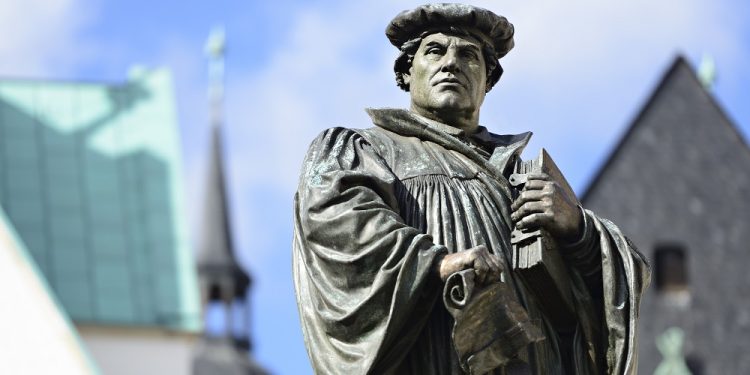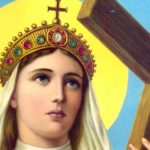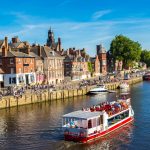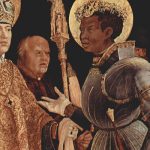
Reformation Day
Traditionally celebrated on October 31st—on the same day as Halloween, Reformation Day is a Protestant holiday that commemorates the Reformation movement started by Martin Luther in the 16th century.
In Slovenia and many of the German states, it is a public holiday, and as such, many arms of the government and court system are often closed. Among English-speaking Lutherans, this holiday is observed on different days according to whether they follow the Lutheran Liturgy or not.
For those who follow the Lutheran Liturgy, October 31st is observed as Reformation Day. For those Lutherans who use the Service Book and Hymnal, the Sunday before is observed as Reformation Sunday. In Chile, it’s celebrated on October 31st but moved to the preceding Friday if it falls on a Tuesday, or to the following Friday if it falls on a Wednesday.
This holiday is significant for parishioners in both the Calvinist and Lutheran churches, as well as other Protestant communities that choose to observe the day. In some parts of Germany, as well as in other countries where it’s officially recognized.
The History Of Reformation Day
On Halloween of 1517, a German monk named Martin Luther nailed his 95 Theses to the door of the Wittenberg Church. These 95 Theses expressed his concerns over corruption found in the Catholic Church. One of his primary concerns was the church selling “indulgences” to people to release them from having to serve penance for their sins—an act that he considered to be people trying to buy their way into heaven. This act opened up a debate with religious scholars of the time that eventually led to the Protestant Reformation.
Martin Luther’s actions caused serious religious and social ripples throughout society. His 95 Theses were widely spread thanks to the newly invented printing press. Within just a couple of weeks, copies of these theses spread all over Germany, and within 60 days, they were all over Europe. On January 3, 1521, Martin Luther and his followers were excommunicated by Pope Leo X.
Just three months later, Martin Luther was called to the Diet of Worms to defend his beliefs before Holy Roman Emperor Charles V. Before this deliberative assembly, Martin Luther was defiant, and the emperor named him not only a heretic but also an outlaw. However, he would receive protection from German princes, and Western Civilization would go on to be forever changed.
Reformation Day has been observed as a holiday since the mid-16th century, but its official date of October 31st wasn’t set until about 1717. This is when it became an official German observance and the date from which it would spread on an international level.
Customs, Traditions & Observations On Reformation Day
This observance day is celebrated in many different ways all across Europe and North America. Some people observe the day from a religious standpoint and use it to attend special church services. Others observe it as any other public holiday and take the time to shop or sightsee.
Areas around Germany often see an influx of visitors on this day. This is especially true in Austria, Poland, and Switzerland. Some Calvinists have taken to making Calvin Jack O’Lanterns for this day. These are pumpkins with the image of John Calvin carved into them. This is somewhat of a controversial practice, however, as some people see it as a graven image and therefore forbidden under Calvin’s own teachings.
Calvin was an iconoclast who not only denounced images of saints as idolatry but also denounced images of God as being the same. One way that this holiday can be observed is by learning more about Martin Luther. Although we covered a basic history of the timeline that led to the establishment of Reformation Day, we left out significant chunks of this man’s life’s work.
That’s why we recommend that people wanting to know more about this holiday should not only read a biography of Martin Luther but should also read the 95 Theses. People should also read some of the basic doctrines from the Reformation, including the 5-Points of Calvinism, The doctrines of the inerrancy and sufficiency of scripture, Tulip & Reformed Theology, and the Five Solas of the Reformation.
Of course, those who would rather sing on this holiday than read a lot of doctrines on the origin and history of the Reformation can do so by singing some Reformation hymns. Martin Luther was a prolific songwriter and wrote several hymns that are still sung to this day. This includes “A Mighty Fortress Is Our God” and “By Grace Alone”. There are also hymns by John Calvin, including “I Greet Thee, Who My Sure Redeemer Art”.
And finally, a sure way to celebrate any holiday, including this one, is by having a feast—in this case, a Reformation Feast. A feast is a great way for people to come together and discuss the history of the Reformation or simply to nourish their bodies and enjoy each other’s company.








